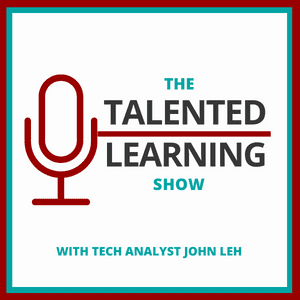
Podcast: Play in new window | Download
Subscribe: Apple Podcasts | Spotify | Amazon Music | Android | iHeartRadio | Blubrry | Email | RSS
EPISODE 43 – TOPIC SUMMARY AND GUEST:
 It’s always a pleasure to talk with visionary learning technology company leaders, and today is no exception. In this podcast episode, I’m thrilled to welcome Graham Glass, CEO of CYPHER LEARNING, a learning platform innovator who is serving multiple LMS markets in a very unique way.
It’s always a pleasure to talk with visionary learning technology company leaders, and today is no exception. In this podcast episode, I’m thrilled to welcome Graham Glass, CEO of CYPHER LEARNING, a learning platform innovator who is serving multiple LMS markets in a very unique way.
Join us as we discuss how the learning systems landscape is changing, and how CYPHER is working creatively to address related challenges and opportunities. Whether you’re an LMS buyer or seller – or you’re just interested in the latest learning industry trends – you won’t want to miss this chance to hear Graham’s perspective.
KEY TAKEAWAYS:
- Many software vendors have struggled to serve multiple LMS markets with a “one-size-fits-all” product. But this company is bucking that trend with a novel platform strategy.
- The pandemic has rocked the training industry. There are profound implications for LMS providers and underlying learning methods.
- The LMS of the future may behave like an “intelligent” companion that proactively guides individuals through their learning journey.
Q&A HIGHLIGHTS:
Although your company serves more than 20,000 customers, it’s not yet a household name in the learning sphere. So could you introduce yourself and your organization?
I’m Graham Glass, the CEO and founder of CYPHER LEARNING. We provide a learning platform – actually three learning platforms – which is a bit unusual. So let me start with some history.
Actually, I used to be a computer science professor at UT Dallas. That’s where I fell in love with teaching and higher education. Then I founded a training company that taught advanced software topics all over the U.S. That’s when I also fell in love with corporate training.
So 15 years ago, I thought, “Wouldn’t it be great to create a single learning platform, and then develop branded versions of it to serve multiple LMS markets?”
So the idea was to develop a world-class platform for K-20 education. Then one for businesses. And finally, one for individuals who offer training as subject-matter experts.
Wow…
Of course, that’s a mammoth task. Most competitors were focused exclusively on K-12 or higher ed or business learning systems.
But I’m quite ambitious, so I thought, “Let’s see if we can pull it off.” And that’s when I founded CYPHER LEARNING.
You’re right. That is highly ambitious. Some companies struggle to serve only one of those LMS markets. Why did you pursue all three?
Three reasons:
- First, I just love these learning specialties and sectors.
- Second, the total addressable market is much bigger. The business space is significantly larger than K-20. So with branded products in all these LMS markets, the potential for massive growth is quite apparent.
- Third, a certain efficiency is involved with this strategy. Some K-20 requirements are different than business needs, but there’s also significant overlap.
No doubt. So why isn’t your brand better-known?
The reason is quite straightforward. We’re also somewhat unusual in that we grew organically. We were self-funded. We didn’t raise a huge amount of money upfront and make a big splash. Instead, we’ve been working stealthily in the background, winning bigger and bigger customers over time.
In comparing K-20 and business learning, you mentioned overlapping capabilities. What does that look like?
I would say 70% of the features are similar. But another 30% are specific to K-20, and a different 30% align with business needs.
Makes sense. But what’s needed on the K-20 side that doesn’t fit in the corporate space?
Well, K-20 relies heavily on assessments. That can include discussion forums, free-form essays, quizzes, surveys, debates. You name it. There might be 12 kinds of assessments to integrate.
Grading relies on a very complex algorithm. And these institutions have grading periods, so things like grade books must be integrated. In addition, peer-review grading is becoming more popular.
So a big portion of any K-20 platform focuses on how to grade, assess and calculate things. And it’s very complicated to implement, by the way.
But if you look at the business market, there’s very little assessment.
Mmm hmmm…
Another big aspect of K-20 is competency-based learning, especially in the U.S. Plus, K-20 has certain standards associated with it. So there’s a heavy emphasis on supporting standards-based grading and competencies.
And although some business systems have very minor support for competencies, it’s not remotely good enough to support K-20.
Alright. So let’s hop back into the corporate world. What business-specific functionality are you developing that K-20 customers don’t need?
Two things come to mind. First, ad-hoc reporting. In the corporate market, you must have a world-class ad-hoc reporting tool to be viable. That’s because corporations want to slice and dice data in many different ways. And they want API access to that reporting capability.
Developing a robust ad-hoc reporting system is a big investment.
No doubt…
Also, in certain business LMS environments, e-commerce integration is a must-have. It’s not just about supporting straightforward purchases. It’s not about simply buying something for $5. It’s about bulk discounts, bundles, subscriptions, multi-tier subscriptions, multi-currency support, automatic tax calculation. The e-commerce needs seem endless.
Right.
Dashboards are another big business need. People want drag-and-drop dashboard builders with customizable widgets. They want to embed reports into their dashboards. They want KPIs, monitoring – all those kinds of things. And no K-20 LMSs include those capabilities, except for our NEO platform.
So what was your roll-out strategy for these different LMS markets?
First, we focused on the K-20 market with NEO LMS. That’s because we could release a free version to put a stake in the ground saying, “Okay, we’re in the LMS business.” And it helped us gain wide adoption fairly quickly. Then we started releasing premium features for NEO and we started charging for that version.
Mmmhmm…
On the other hand, businesses won’t touch a free product. They want to pay for all the features they need, and they want full support. So a year after we launched NEO premium, we released the first version of MATRIX LMS for business, which was a shadow of the current product.
But now we basically build both products in parallel. So our roadmap always includes core features that are beneficial to everybody. But also, our pipeline always includes features that are NEO-specific and MATRIX-specific.
Interesting. So have these platforms forked, or they basically the same product?
We’ve got one engineering team, one code base, one sales team, one marketing team. It took a lot to get here, but now it’s an incredibly efficient company because there is just one of everything.
Fantastic. Such a unique approach. So, what is your geographic reach?
I warned you that we’re a fairly unusual company. And that’s also reflected in our geographic footprint. We decided we were going global in year one.
So we did a lot of crafty things with auto-translation and community-based translation. And then, when we started hiring teams, we hired all over the world. So now we have a presence in 15 countries.
Nice…
In fact, more NEO revenue comes from outside the U.S. than from within this country. And 50% of MATRIX revenue comes from outside the U.S.
Our products are available in 40 languages and they’re deployed in 100 countries around the world. So we’re truly a global company.
Excellent. So let’s shift gears and talk about COVID. What changes have you seen since the start of the pandemic?
Well, we’ve seen three key trends:
- First, there was an obvious explosion in K-20 LMS usage. I remember coming to my office one day and finding that our traffic had doubled overnight. That kind of stressed our engineering team, but they hustled and scaled really well. So apparently, many educators weren’t previously using an LMS or were only barely using one. And suddenly they realized that they needed a platform like NEO to operate successfully at a distance.
- Also, as a preferred learning platform provider for Dell, we saw a big increase in very large deals from countries around the world. And instead of coming from individual universities, these orders were from governments that realized they needed a disaster-proof platform that is localized, scalable and user-friendly.
- In the business market, we didn’t see the same kind of growth. But we did notice that a lot of deals were paused, which is what I would have predicted. Many large companies initially suspended their plans for 9 or 10 months. But they did resume their plans, and those deals are closing again.
Bottom line, I think there’s now a much better understanding that if you’re using a learning platform for any kind of remote, asynchronous learning model, you really need to structure courses differently than in-person training.
So the pandemic didn’t just cause business changes. It helped organizations realize that they need to think differently about supporting the learning process, itself.
Good points. And what does that mean for your products? What do you see ahead?…





